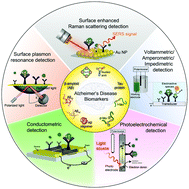Chemical sensing platforms for detecting trace-level Alzheimer's core biomarkers
Abstract
Alzheimer's disease (AD) is the most prevalent neurodegenerative disorder and affects more than 10% of the population aged over 65 worldwide. Despite considerable global efforts, AD patients can only be diagnosed after the onset of symptoms based on neuropsychological tests and neuroimaging. Because the changes in the levels of biomarkers associated with Aβ deposits and tau tangles precede the appearance of the first cognitive symptoms, accurate measurements of AD core biomarkers is critical for identifying asymptomatic AD patients and predicting disease progression. In this regard, significant efforts have been made to develop novel AD biomarker-targeting sensor platforms that have superb sensitivity and high accessibility. This review provides an overview of recent advances in optical and electrical sensing of core AD biomarkers in clinically relevant fluids such as the cerebrospinal fluid and human blood. We have summarized current challenges and future strategies for translating the sensing techniques discovered in the academic laboratories into clinical analytic platforms for early diagnosis of AD.



 Please wait while we load your content...
Please wait while we load your content...